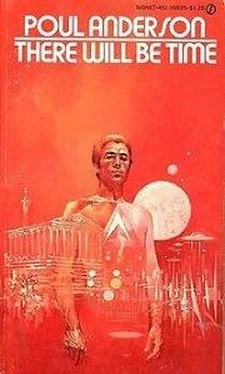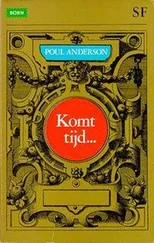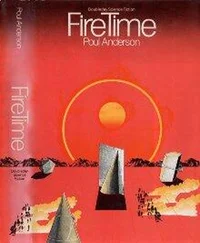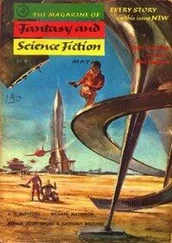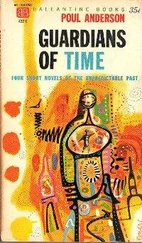Poul Anderson - There Will Be Time
Здесь есть возможность читать онлайн «Poul Anderson - There Will Be Time» весь текст электронной книги совершенно бесплатно (целиком полную версию без сокращений). В некоторых случаях можно слушать аудио, скачать через торрент в формате fb2 и присутствует краткое содержание. Год выпуска: 1972, Издательство: Doubleday, Жанр: Фантастика и фэнтези, на английском языке. Описание произведения, (предисловие) а так же отзывы посетителей доступны на портале библиотеки ЛибКат.
- Название:There Will Be Time
- Автор:
- Издательство:Doubleday
- Жанр:
- Год:1972
- ISBN:нет данных
- Рейтинг книги:5 / 5. Голосов: 1
-
Избранное:Добавить в избранное
- Отзывы:
-
Ваша оценка:
- 100
- 1
- 2
- 3
- 4
- 5
There Will Be Time: краткое содержание, описание и аннотация
Предлагаем к чтению аннотацию, описание, краткое содержание или предисловие (зависит от того, что написал сам автор книги «There Will Be Time»). Если вы не нашли необходимую информацию о книге — напишите в комментариях, мы постараемся отыскать её.
Nominated for Hugo Award for Best Novel in 1973.
There Will Be Time — читать онлайн бесплатно полную книгу (весь текст) целиком
Ниже представлен текст книги, разбитый по страницам. Система сохранения места последней прочитанной страницы, позволяет с удобством читать онлайн бесплатно книгу «There Will Be Time», без необходимости каждый раз заново искать на чём Вы остановились. Поставьте закладку, и сможете в любой момент перейти на страницу, на которой закончили чтение.
Интервал:
Закладка:
“How do you propose to go about it?”
His gaze was cat-cool. “I start by becoming rich.”
For years which followed, I am barely on the edge of his story.
He’d see me at intervals, I think more to keep our friendship alive than to bring me up to date-since he obviously wanted Kate’s company as much as mine. But I have only indirect news of his career. Often, in absence, he would become a dream in my mind, so foreign was he to our day-by-day faster-and-faster-aging small-town life, the growing up of our sons, the adventure of daughters-in-law and grandchildren. But then he would return, as if out of night, and for hours I would again be dominated by that lonely, driven man.
I don’t mean he was fanatical. In fact, he continued to gain in perspective and in the skill of savoring this world. His intellect ranged widely, though it’s clear that history and anthropology must be his chief concerns. As a drop of fortune, he had a talent for learning languages. (He and I wondered how many time travelers were wing-clipped by the mere lack of that.) Sardonic humor and traditional Midwestern courtesy combined to make his presence pleasant. He became quite a gourmet, while staying able to live on stockfish and hardtack without complaint. He kept a schooner in Boston, whereon he took Kate and me to the West Indies in celebration of our retirement. While the usages of his boyhood made him reticent about it, I learned he was deeply sensitive to beauty both natural and manmade; of the latter, he had special fondness for Baroque, Classical, and Chinese music, for fine ships and weapons, and for Hellenic architecture. (God, if You exist, I do thank You from my inmost heart that I have seen Jack Havig’s photographs of the unruined Acropolis.)
I was the single sharer of his secret, but not his single friend. Theoretically he could have been intimate with everyone great, Moses, Pericles, Shakespeare, Lincoln, Einstein. But in practice the obstacles were too much. Besides language, custom, and law, the famous were hedged off by being busy, conspicuous, sought-after. No, Havig — I called him “Jack” to his face, but now it seems more natural to write his surname — Havig told me about people like his lively little Meg (three hundred years dust), or a mountain man who accompanied Lewis and Clark, or a profane old moustache who had marched with Napoleon.
(“History does not tend to the better, Doc, it does not, it does not. We imagine so because events have produced our glorious selves. Think, however. Put aside the romantic legends and look at the facts. The average Frenchman in 1800 was no more unfree than the average Englishman. The French Empire could have brought Europe together, and could have been liberalized from within, and there might have been no World War I in which Western civilization cut its own throat. Because that’s what happened, you know. We’re still busy bleeding to death, but we haven’t far to go now.”)
Mainly his time excursions were for fun, in that period between his acquiring the techniques and resources to make them effective, and his development of a search plan for fellow mutants. “To be honest,” he grinned, “I find myself more and more fond of low-down life.”
“Toulouse-Lautrec’s Paris?” I asked at random. He had already told me that earlier decadences were overrated, or at least consisted of tight-knit upper classes which didn’t welcome strangers.
“Well, I haven’t tried there,” he admitted. “An idea, maybe. On the other hand, Storyville in its flowering—” He wasn’t interested in the prostitutes; if nothing else, he had by now seen enough of the human condition to know how gruesome theirs usually was. He went for the jazz, and for the company of people whom he said were more real than most of his own generation, not to speak of 1970.
Meanwhile he made his fortune.
You suppose that was easy. Let him look up the stock market quotations — 1929 is an obvious year — and go surf on the tides of Wall Street.
The fact was different. For instance, what might he use for money?
While in Europe, he bought gold or silver out of his pay, which he exchanged for cash in various parts of the nineteenth and later eighteenth centuries. With that small stake, he could begin trading. He would take certain stamps and coins uptime and sell them to dealers; he would go downtime with a few aluminum vessels, which were worth more than gold before the Hall process was invented. But these and similar dealings were necessarily on a minute scale, both because the mass he could carry was limited and because he dared not draw overmuch attention to himself.
He considered investing and growing wealthy in that period, but rejected the idea. The rules and mores were too peculiar, too intricate for him to master in as much of his lifespan as he cared to spend. Besides, he wanted to be based in his own original era; if nothing else, he would need swift spatial transportation when he began his search. Thus he couldn’t simply leave money in the semi-distant past at compound interest. The intervening years gave too many chances for something to go wrong.
As for a more manageable point like 1929, what gold he brought would represent a comparatively truing sum. Shuttling back and forth across those frantic days, he could parlay it — but within strict limits, if he wasn’t to be unduly noticed. Also, he must take assorted federal agencies into account, which in the years ahead would become ever better equipped to be nosy.
He never gave me the details of his operations. “Frankly,” he said, “finance bores me like an auger. I found me a couple of sharp partners who’d front, and an ultra-solid bank for a trustee, and let both make more off my ‘economic analyses’ than was strictly necessary.”
In effect, John Franklin Havig established a fund, including an arrangement for taxes and the like, which was to be paid over to “any collateral male descendant” who met certain unambiguous standards, upon the twenty-first birthday of this person. As related, the bank was one of those Eastern ones, with Roman pillars and cathedral dimness and, I suspect, a piece of Plymouth Rock in a reliquary. Thus when John Franklin Havig, collateral descendant, was contacted in 1954, everything was so discreet that he entered his millionaire condition with scarcely a ripple. The Senlac Trumpet did announce that he had received a substantial inheritance from a distant relative.
“I let the bank keep on managing the bucks,” he told me. “What I do is write checks.”
After all, riches were merely his means to an end.
No, several ends. I’ve mentioned his pleasures. I should add the help he gave his mother and, quietly, others. On the whole, he disdained recognized charities. “They’re big businesses,” he said. “Their executives draw down more money than you do, Doc. Besides, to be swinishly blunt, we have too many people. When you’ve seen the Black Death, you can’t get excited about Mississippi sharecroppers.” I scolded him amicably for being such a right-winger when he had witnessed laissez-faire in action, and he retorted amicably that in this day and age liberals like me were the ones who had learned nothing and forgotten nothing, and we had us a drink… But I believe that, without fuss, he rescued quite a few individuals; and it is a fact that he was a substantial contributor to the better conservationist organizations.
“We need a reserve of life, every kind of life,” he explained. “Today for the spirit-a glimpse of space and green. Tomorrow for survival, flat-out survival.”
The War of Judgment, he said, would by no means be the simple capitalist-versus-Communist slugfest which most of us imagined in the 1950’s.
“I’ve only the vaguest idea yet of what actually will go on. Not surprising. I’ve had to make fugitive appearances — watching out for radioactivity and a lot else — and who in the immediate sequel is in any condition to give me a reasoned analysis? Hell, Doc, scholars argue today about what went wrong in 1914 to ’18, and they aren’t scrambling for a leftover can of dogfood, or arming against the Mong who’ll pour across a Bering Straits that all the dust kicked into the atmosphere will cause to be frozen.”
Читать дальшеИнтервал:
Закладка:
Похожие книги на «There Will Be Time»
Представляем Вашему вниманию похожие книги на «There Will Be Time» списком для выбора. Мы отобрали схожую по названию и смыслу литературу в надежде предоставить читателям больше вариантов отыскать новые, интересные, ещё непрочитанные произведения.
Обсуждение, отзывы о книге «There Will Be Time» и просто собственные мнения читателей. Оставьте ваши комментарии, напишите, что Вы думаете о произведении, его смысле или главных героях. Укажите что конкретно понравилось, а что нет, и почему Вы так считаете.
